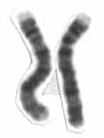Haemophilia C
(Redirected from Rosenthal syndrome)
Editor-In-Chief: Prab R Tumpati, MD
Obesity, Sleep & Internal medicine
Founder, WikiMD Wellnesspedia &
W8MD medical weight loss NYC and sleep center NYC
| Haemophilia C | |
|---|---|
| File:Protein F11 PDB 1xx9.png | |
| Synonyms | Factor XI deficiency, Rosenthal syndrome |
| Pronounce | |
| Specialty | Hematology |
| Symptoms | Bleeding |
| Complications | Hemorrhage |
| Onset | Varies |
| Duration | Lifelong |
| Types | |
| Causes | Genetic mutation |
| Risks | Family history |
| Diagnosis | Blood test |
| Differential diagnosis | Haemophilia A, Haemophilia B |
| Prevention | None |
| Treatment | Fresh frozen plasma, Antifibrinolytics |
| Medication | |
| Prognosis | Generally good with treatment |
| Frequency | Rare |
| Deaths | |
Haemophilia C is a rare genetic disorder that affects the blood's ability to clot. It is also known as Factor XI deficiency or Rosenthal syndrome. This condition is caused by a deficiency of a protein called Factor XI, which is necessary for blood clotting.
Symptoms[edit | edit source]
The symptoms of Haemophilia C can vary greatly among individuals. Some people may have no symptoms, while others may experience severe bleeding. Common symptoms include:
- Nosebleeds
- Bleeding gums
- Easy bruising
- Prolonged bleeding from cuts
- Heavy menstrual bleeding in women
- Bleeding into joints and muscles
Causes[edit | edit source]
Haemophilia C is caused by mutations in the F11 gene, which provides instructions for making Factor XI. This protein plays a crucial role in the coagulation cascade, a series of chemical reactions that forms blood clots in response to injury. Mutations in the F11 gene reduce the amount or activity of Factor XI, leading to the bleeding problems characteristic of Haemophilia C.
Diagnosis[edit | edit source]
Diagnosis of Haemophilia C is based on a blood test that measures the amount of Factor XI in the blood. A low level of Factor XI is indicative of Haemophilia C.
Treatment[edit | edit source]
Treatment for Haemophilia C typically involves replacing the missing Factor XI. This can be done through infusions of plasma or Factor XI concentrate. In some cases, antifibrinolytic drugs may be used to help prevent bleeding.
See also[edit | edit source]
References[edit | edit source]
Search WikiMD
Ad.Tired of being Overweight? Try W8MD's physician weight loss program.
Semaglutide (Ozempic / Wegovy and Tirzepatide (Mounjaro / Zepbound) available.
Advertise on WikiMD
|
WikiMD's Wellness Encyclopedia |
| Let Food Be Thy Medicine Medicine Thy Food - Hippocrates |
Translate this page: - East Asian
中文,
日本,
한국어,
South Asian
हिन्दी,
தமிழ்,
తెలుగు,
Urdu,
ಕನ್ನಡ,
Southeast Asian
Indonesian,
Vietnamese,
Thai,
မြန်မာဘာသာ,
বাংলা
European
español,
Deutsch,
français,
Greek,
português do Brasil,
polski,
română,
русский,
Nederlands,
norsk,
svenska,
suomi,
Italian
Middle Eastern & African
عربى,
Turkish,
Persian,
Hebrew,
Afrikaans,
isiZulu,
Kiswahili,
Other
Bulgarian,
Hungarian,
Czech,
Swedish,
മലയാളം,
मराठी,
ਪੰਜਾਬੀ,
ગુજરાતી,
Portuguese,
Ukrainian
Medical Disclaimer: WikiMD is not a substitute for professional medical advice. The information on WikiMD is provided as an information resource only, may be incorrect, outdated or misleading, and is not to be used or relied on for any diagnostic or treatment purposes. Please consult your health care provider before making any healthcare decisions or for guidance about a specific medical condition. WikiMD expressly disclaims responsibility, and shall have no liability, for any damages, loss, injury, or liability whatsoever suffered as a result of your reliance on the information contained in this site. By visiting this site you agree to the foregoing terms and conditions, which may from time to time be changed or supplemented by WikiMD. If you do not agree to the foregoing terms and conditions, you should not enter or use this site. See full disclaimer.
Credits:Most images are courtesy of Wikimedia commons, and templates, categories Wikipedia, licensed under CC BY SA or similar.
Contributors: Prab R. Tumpati, MD




